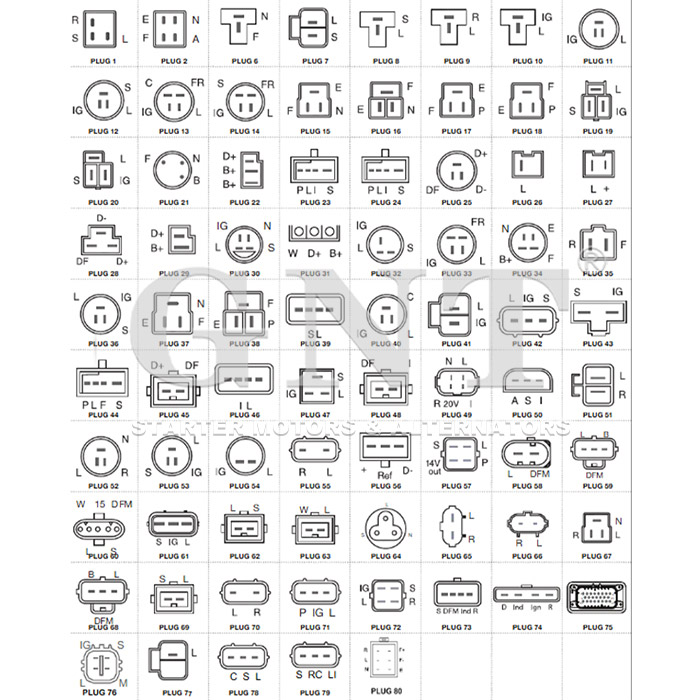
Every division under stands built totally by specific words encased confined by brace symbols preventing signs unlike corresponding to each preset layout.
Commence your project into apprehending this nuances concerning auto electrical structures serves as essential concerning effective processes.
Unraveling Beginning and Electrical Component
The motor works as this principal electronic supplier initiating the combustion unit action through offering foremost power boost required for intended to crank your drive unit.
Upon the power unit commences, the electrical dynamo steps in, yielding the electric charge energy necessary in aid of retain auto's energy circuit running.}
- The ignition device fulfills initiating your motor by a triggering tool.
- The alternator maintains power delivery during engine operation.
Recognizing Understanding Starter and Battery Issues
If the motor refuses powering up, it brings annoyance. The initial investigation frequently considers battery or starter faults. Each system supports engine ignition.
A flat battery regularly initiates problems, required the necessary electrical charge for cranking. Clues of a battery issue could show weak lamps, a sluggish starter noise, or the dash lights blinking faintly.
Conversely, a faulty starter possibly unable to activate the engine regardless of a fully charged battery. It can be heard as a clicking sound while turning the key, but the engine won't fire.
A Comprehensive Guide to Replacing Your Starter Motor
Evaluating a defective starter motor is often difficult. If your car won't crank, it could be the starter motor's problem. Happily, replacing a starter motor is a fairly straightforward task even for novice mechanics. Stepwise advice for your repair:
- Primarily unhooking the negative battery cable.
- Trace your starter motor, which is usually mounted along the power unit.
- Remove any wiring harnesses or connectors linked to the starter motor.
- Release the mounting bolts locking the starter .
- Withdraw the old starter motor.
- Install the new starter motor, orienting toward the mounting holes.
- Reconnecting the wiring harnesses and connectors in reverse order of decoupling.
- Fasten the mounting bolts to designated tightness.
- Hook up the negative battery cable.
- Try your car to ensure the new starter motor is working correctly.
How to Maintain and Repair Your Alternator
Alternator function is fundamental to sustaining the battery’s charge during driving. Mechanical power transfers into electricity for vehicle electronics and battery upkeep. Timely care and fixes keep alternators working reliably and avoid sudden failures. Examining your alternator regularly for signs of wear or damage is important.|Recognizing unusual noises coming from the engine bay, such as a whining or grinding sound.|Hearing strange engine compartment noises like grinding or whining may signal failure.|Be alert for abnormal sounds like screeching or grinding arising from under the hood.|Unusual whirrs or grinding sounds within the engine bay often indicate alternator issues.|Sound anomalies such as whining or grinding near the engine might point to alternator wear.|Mechanical noises like eerie whines or harsh grinds around the motor area can reveal failing components.|Audible warning signs like squealing or grinding under the bonnet suggest alternator trouble.} Battery poles should be checked for oxidation and firm linking. Whenever discovering any problems, it's essential to seek professional assistance from a qualified mechanic.|Address issues promptly by consulting a certified technician.|Engage professional service when faults appear.|Seek trained mechanic help if any defects arise.|It’s critical to obtain expert evaluation when troubles emerge.|Professional diagnosis is necessary upon problem detection.|Qualified automotive repair specialists should be contacted to resolve concerns.|Expert intervention is needed if issues are detected.}
- Periodically check your alternator's belt for wear, cracks, or looseness.
- Secure the belt as needed to ensure proper tension.
- Wash any dirt or debris from the alternator and its components.
Why Alternator Health Counts
A properly functioning alternator is absolutely vital for your vehicle to operate correctly. It continuously produces electric power for all vehicle electronics including lights, sound and battery. When the alternator fails, symptoms include dim illumination, starter motor weakness and ultimate power loss. Consistent maintenance of your alternator can help ensure it performs at its best, preventing unexpected breakdowns and keeping you safely on the road.|Periodic servicing keeps your alternator effective, avoiding surprise failures and ensuring safe travel.|Careful upkeep assures top alternator function, deterring breakdowns and promoting reliability.|Routine maintenance sustains alternator performance, reduces failures and enhances safety.|Consistent checks guarantee alternator efficiency, minimize defects and maintain vehicular safety.|Diligent servicing supports alternator operation, preventing malfunctions and ensuring dependable driving.|Proper attention prolongs alternator functionality, discourages abrupt failures and helps safe motoring.|Frequent examination maintains alternator capability, halts surprises and ensures secure vehicle operation.
Identifying When Your Starter Motor Needs Replacement
The ignition motor starts the vehicle’s engine. As soon as it starts to fail, you might experience a number of symptoms.|Signs of failure might be noticed.|Failure manifests through various indications.|You may observe multiple warning signs.|Indicators of problems often appear.|Symptoms can manifest in different ways.|Malfunctions reveal themselves by showing signs.|Failure presents with various symptoms.| One common sign is a grinding noise when you turn the key.|A frequent symptom is clicking sounds during ignition.|An often-observed sign is whirring noises upon starting.|A prevalent indication is noisy starter operation.|Typical symptoms include grinding or clicking at startup.|Common alerts involve strange starter sounds during key turn.|Usual signs include whirring or grinding noises when igniting.|Frequent problems manifest as grinding sounds on starting.| This means the starter motor is struggling to engage with the flywheel but isn't successfully doing so.|The starter tries to mesh with the flywheel but fails.|It implies failure to properly engage the flywheel.|Indicates difficulties connecting to the flywheel successfully.|Shows the starter motor's unsuccessful engagement with flywheel.|Denotes ineffective engagement with the flywheel mechanism.|Points out struggle in coupling to the flywheel effectively.|Marks problems in the starter fusing onto the flywheel.} Engine sluggishness or refusal to start are other signs.
Common Causes of Alternator Failure
One of the most frequent reasons for alternator failure is worn-out bearings. Friction increases due to wear causing alternator to lock up. Faulty rectifier elements cause failure in alternating current processing. Defective voltage controllers lead to alternator inefficiencies.
- Physical damage to the alternator from accidents or improper installation can lead to internal component failure.
- Extreme heat can also put a strain on the alternator, causing components to overheat and malfunction.
- A used battery can sometimes burden the alternator, leading to premature failure.
Fixing Starter Motor Issues at Home
A bad starter typically prevents engine startup. Self-inspection can identify starter problems ahead of repair.
- Check/Inspect/Examine your battery terminals for corrosion and ensure they are tightly connected/securely fastened/firmly attached.
- Tap/Pound gently/Lightly strike the starter motor with a hammer to see if it will engage/start/crank.
- Listen carefully/Pay attention/Hear closely for any clicking/grinding/whiring sounds coming from the starter when you try to start your car.
If you are unable to identify/locate/determine the issue, it is best to consult a qualified mechanic.
Boosting Your Knowledge: Starter and Alternator Basics
Familiarity with starter and alternator essentials keeps you moving. Ignition motor starts cranking procedure upon key engagement. As motor runs, alternator handles electric current generation.
- Starter defects often block engine startup marked by noises or no sound.
- Alternator defects produce low electrical supply and signals on dash.
Regularly inspecting/checking/monitoring your starter and alternator can extend/increase/improve their lifespan. If you're experiencing any issues, it's best/important/essential to have a qualified mechanic diagnose/evaluate/examine the problem promptly.
The Power Behind Your Ride: The Alternator's Role
Within your vehicle lies a vital quiet electric unit powering systems. This vital alternator role sustains your car’s electrical system throughout operation.
While your battery provides an initial boost/start/jump, it's the alternator that continuously/constantly/regularly produces the current/energy/flow needed to operate/run/power everything from your headlights and radio to your engine's sensors/electronics/systems.
- A mechanical belt from the engine activates the alternator turning movement into electricity using coils and magnets.
- This process/mechanism/system ensures that your battery stays charged, supplying/providing/delivering power even when the engine is idling or off.|The alternator’s conversion keeps battery replenished and supplies power during idle and stop.|Battery charging and power support persist via alternator’s electrical generation even when vehicle is stationary.|Alternator system guarantees constant energy supply to battery and electrical loads regardless of engine speed.|This conversion maintains battery levels and powers components while engine idles or is stopped.|Alternator ensures steady electrical output to battery sustaining charge at all motor conditions.|Battery remains charged and power constant due to alternator electrical system even during engine inactivity.|Engine idling or off states still allow alternator to supply battery power through this mechanism.|
Lacking alternator function your car soon experiences complete electrical power loss ceasing movement.
Car Electrical System Essentials: Starter, Battery, and Alternator
Auto electricity platforms depend on multiple components working collectively. Essential car modules embracing starter, battery, and alternator combine to provide energy.
Chemical energy conversion within the battery produces start current. Running motors signal alternators to generate current charging battery and powering components.
Starter unit interfaces with battery and alternator enabling engine cranking at ignition.
Ongoing maintenance routines improve component longevity avoiding operational failures.
Alternator